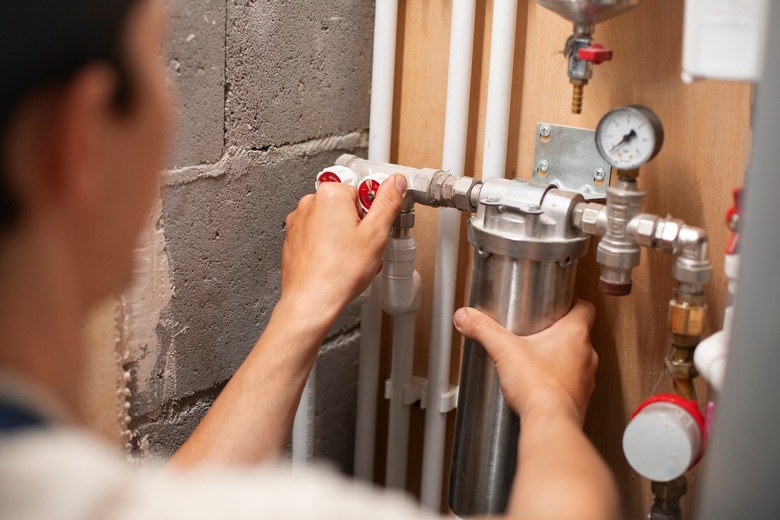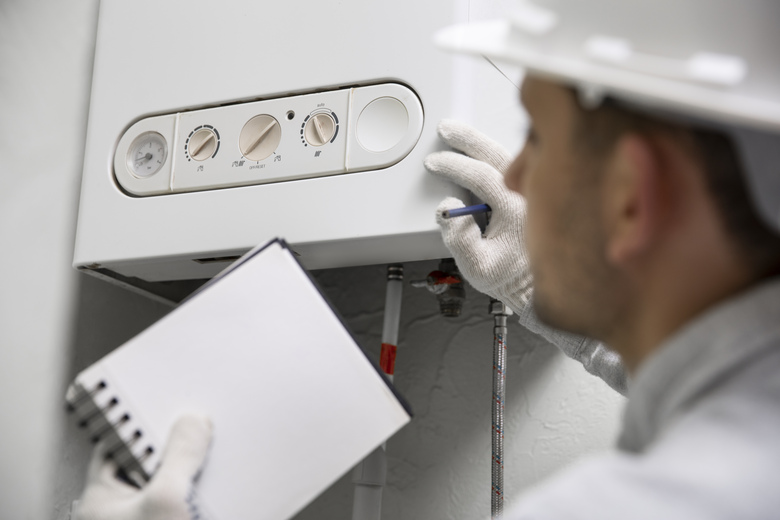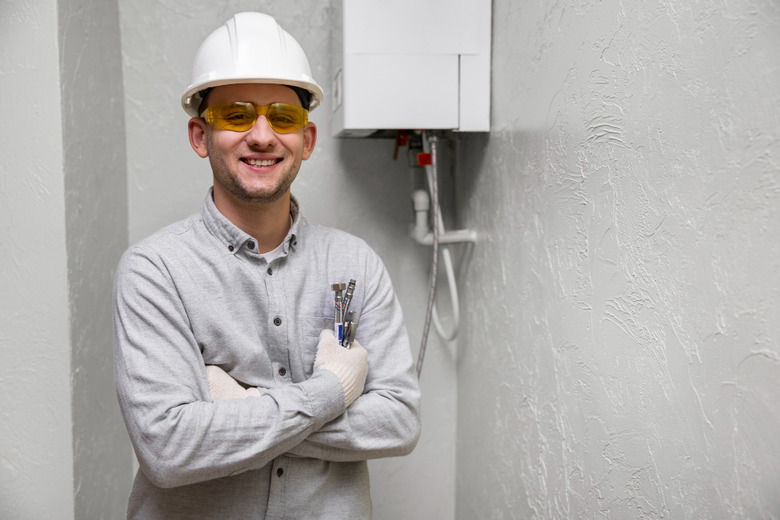Home efficiency is a critical aspect of maintaining a comfortable and cost-effective living environment. One often overlooked but significant factor in home efficiency is the state of your water heater. A reliable and efficient water heater is especially important in Torrington, CT, where temperatures can drop significantly. Timely water heater replacement ensures your home remains energy-efficient and helps keep your utility bills manageable and your hot water supply consistent.
Table of Contents
Key Takeaways
4 Signs Your Water Heater Needs Replacement
What are the Benefits of Replacing Your Water Heater
4 Factors to Consider When Replacing Your Water Heater
How to Maintain Your New Water Heater for Optimal Efficiency
Professional Installation vs. DIY Replacement: Which is Better?
Frequently Asked Questions
Trust L&P Plumbing for Expert Water Heater Replacement
| Key Takeaways ✔ Replace water heaters every 8-12 years to maintain efficiency and avoid frequent repairs. ✔ Modern water heaters can reduce energy consumption by up to 20%, lowering utility bills. ✔ New water heaters provide reliable and consistent hot water supply. ✔ Upgrading to efficient models reduces greenhouse gas emissions and conserves energy. ✔ Regular maintenance, such as flushing the tank and checking the anode rod, is essential for optimal performance. ✔ Hiring professionals for installation ensures safety and proper operation, preventing costly DIY mistakes. |
4 Signs Your Water Heater Needs Replacement
Home efficiency relies on the condition of your appliances, and your water heater plays a pivotal role. However, water heaters can only last between 8 to 12 years. Recognizing the signs indicating the need for a water heater replacement can save you from higher energy bills and inconsistent hot water supply. Here are some key indicators that it might be time to consider a new water heater.
- Age of the Water Heater
Water heaters typically last 8 to 12 years. If yours is approaching or has surpassed this age range, it might be time for a replacement. Water heaters’ efficiency declines as they age, leading to higher energy consumption. Additionally, older units are more prone to breakdowns, resulting in costly repairs and interruptions in hot water supply.
- Frequent Repairs
Constant repairs indicate that your water heater is no longer functioning efficiently. If you frequently call a technician, it is a sign that the unit is wearing out and may soon fail completely. Opting for a water heater replacement can save you from ongoing repair expenses and ensure reliable hot water.
- Rising Energy Bills
An old water heater might be the culprit if you notice a spike in your utility bills without changing usage patterns. As water heaters age, they require more energy to heat the same amount of water, leading to higher costs. Replacing an outdated model with a new, energy-efficient unit can substantially lower your energy bills and improve overall efficiency.
- Inconsistent Hot Water Supply
If your water temperature fluctuates or you run out of hot water quickly, it may be time for a water heater replacement. These issues often indicate that the water heater struggles to maintain a consistent temperature. A new water heater can provide a steady and reliable hot water supply, enhancing comfort and convenience in your home.
What are the Benefits of Replacing Your Water Heater
Heating water ranks as the second-largest energy expense in your home, accounting for approximately 18% of your utility costs. Upgrading to a new water heater can bring numerous advantages to your home. By replacing your old water heater, you can enjoy a more reliable hot water supply and contribute to environmental conservation.
Improved Energy Efficiency
Modern water heaters are designed to be more energy-efficient than older models. A new water heater can decrease energy usage by approximately 0.3 quads in the near term, potentially reaching up to 1.0 quads in the long term. An energy-efficient water heater can contribute to a smaller carbon footprint as well, making it an eco-friendly choice.
Cost Savings on Utility Bills
Replacing an old, inefficient water heater can yield substantial cost savings on utility bills. Homeowners can save an average of $100 to $300 annually by upgrading to a more efficient model. These savings can offset the initial cost of purchasing and installing the new unit over time. By investing in a new water heater, you not only improve your home’s efficiency but also reduce long-term operating costs.
Enhanced Performance and Reliability
Water heater replacements provide a more consistent and reliable supply of hot water. This means you can enjoy hot water when you need it, without worrying about sudden temperature fluctuations or running out during peak usage times. Enhanced performance is particularly beneficial for larger households with high hot water demands.
Environmental Benefits
Modern, energy-efficient water heaters have a reduced environmental impact compared to older models. By using less energy to heat water, these units help lower greenhouse gas emissions. Choosing an efficient water heater benefits your home and supports broader environmental sustainability efforts.
Improved Safety Features
New water heaters have advanced safety features that older models may lack. These can include automatic shut-off mechanisms, pressure relief valves, and enhanced thermostats to prevent overheating. Such features reduce the risk of accidents, such as scalding or water heater explosions.
4 Factors to Consider When Replacing Your Water Heater
When it’s time for a water heater replacement, several key factors should guide your decision. Carefully considering these elements can ensure optimal performance and energy savings.
1. Types of Water Heaters
When it comes to water heater replacement, selecting the right type of unit is crucial for meeting your household’s hot water needs efficiently.
Here are the main types of water heaters to consider:
Tank Water Heaters
These traditional units store a large volume of hot water in a tank, typically ranging from 20 to 80 gallons. They are less expensive to purchase and install but tend to use more energy due to the need to constantly keep the water hot.
Tankless Water Heaters
Tankless, or on-demand, water heaters heat water only when it is needed, eliminating the standby heat loss associated with tank models. They are more energy-efficient and provide an endless hot water supply. However, they are more costly upfront and may require upgrades to your home’s electrical or gas systems.
Heat Pump Water Heaters
These units use electricity to move heat from the air or ground to heat water, making them highly energy-efficient. They are best suited for warm climates and can significantly reduce energy costs, although they have a higher initial cost and require more space.
Solar Water Heaters
Solar water heaters use energy from the sun to heat water, offering an environmentally friendly and cost-effective solution in the long term. They are ideal for sunny regions but have high installation costs and require a backup system for cloudy days.
Condensing Water Heaters
These units are like conventional tank water heaters but use exhaust gases to heat the water, making them more energy-efficient. They are particularly beneficial for homes that use natural gas as their primary energy source, providing a more efficient option with lower operating costs.
2. Energy Source Options
Choosing the right energy source for your water heater replacement is vital in ensuring both efficiency and cost-effectiveness. Each energy source comes with its own set of advantages and considerations, which will affect your water heater’s overall performance, operating costs, and environmental impact.
Here are the main energy source options to consider:
Electric Water Heaters
Electric water heaters are popular for their ease of installation and low upfront costs. They are widely available and can be installed almost anywhere, but they typically have higher operating costs due to electricity rates and can be less efficient compared to other energy sources.
Gas Water Heaters
Gas water heaters, powered by natural gas or propane, are generally more energy-efficient and cheaper to operate than electric models. They heat water quickly and are ideal for homes with high hot water demands, but they require access to a gas line and proper ventilation to avoid safety hazards.
Solar Water Heaters
Solar water heaters use the sun’s energy to heat water, making them the most environmentally friendly option. They can significantly reduce energy bills in sunny climates but come with higher initial installation costs and depend on weather conditions, necessitating a backup system for cloudy days.
Heat Pump Water Heaters
Heat pump water heaters use electricity to transfer heat from the air or ground to heat water, making them extremely energy-efficient. They are best suited for warm climates and can reduce energy consumption by up to 60%, but they have higher upfront costs and require more space for installation.
Propane Water Heaters
Propane water heaters are similar to natural gas models but use propane as the fuel source, which is particularly useful in areas without natural gas lines. They are efficient and provide quick heating, but propane can be more expensive than natural gas and requires regular delivery or tank refills.
3. Capacity and Size
When it comes to water heater replacement, selecting the right size is essential for efficiently meeting your household’s hot water needs. If the unit is too small, it won’t provide enough hot water, causing frequent shortages and potentially straining the system.
Conversely, an oversized water heater will waste energy by heating more water than needed, leading to increased utility bills and unnecessary energy consumption. To ensure correct water heater capacity, consult a professional to assess your household’s specific hot water requirements and recommend an appropriately sized unit.
4. Efficiency Ratings
When considering a water heater replacement, look for models with high Energy Star ratings. These ratings indicate that the unit meets strict energy efficiency guidelines set by the Environmental Protection Agency (EPA), ensuring that the water heater operates efficiently and effectively.
High-efficiency units not only provide optimal performance but also help lower operating costs by reducing energy consumption. Investing in an Energy Star-rated water heater can lead to significant savings on your utility bills over the lifespan of the unit.

How to Maintain Your New Water Heater for Optimal Efficiency
Maintaining your new water heater is essential for ensuring it operates at peak efficiency and lasts as long as possible. Regular maintenance can prevent issues, save energy, and avoid costly repairs. Following these simple steps after a water heater replacement can keep your heater running smoothly and efficiently.
Regular Maintenance Checks
Scheduling regular maintenance checks is essential for keeping your water heater running efficiently. During these annual inspections, a professional can identify potential issues before they escalate into major problems. This proactive approach can significantly prolong the lifespan of your water heater, providing you with reliable hot water for years to come.
Flush the Tank
Flushing your water heater tank at least once a year is a crucial maintenance task. This process involves draining the tank to remove sediment buildup, which can accumulate over time and reduce the efficiency of the heater. By regularly flushing the tank, you can prevent this buildup, maintain optimal efficiency, and extend the life of your water heater.
Check the Anode Rod
The anode rod is a critical component that protects your water heater from corrosion. Made of magnesium or aluminum, the rod attracts corrosive elements in the water, sacrificing itself to prevent rust from affecting the tank. Inspecting and replacing the anode rod every few years is vital to ensure it continues to perform this protective function.
Insulate the Water Heater
Insulating your water heater can greatly reduce heat loss and improve overall efficiency. This is particularly important in colder climates like Torrington, CT, where maintaining a consistent water temperature is crucial to avoid unnecessary energy consumption. Adding insulation to the tank and the first few feet of the hot and cold water pipes can help retain heat, reducing the workload on your heater.
Professional Installation vs. DIY Replacement: Which is Better?
When it comes to water heater replacement, deciding between professional installation and a DIY approach can be challenging. Each option has its own set of advantages and potential drawbacks. Understanding the key differences can help you make an informed choice that best suits your needs and ensures optimal performance.
Here’s a detailed comparison of professional installation versus DIY replacement.
Pros of Professional Installation
Expertise and Knowledge
Professional water heater replacement installers have the necessary training and experience to handle water heater installations correctly. Their expertise ensures that the job is done safely and according to local codes and regulations.
Warranty Protection
Many manufacturers require professional water heater replacement installation for the warranty to remain valid. This protects your investment by covering water heater replacements or repairs if issues arise.
Safety
Professionals are well-versed in safety protocols, reducing the risk of accidents such as gas leaks, electrical issues, or water damage during the water heater replacement process. Their adherence to safety standards ensures a secure installation process.
Efficiency
A professional water heater replacement installation is typically quicker and more efficient than a DIY attempt. Professionals have the tools and knowledge to complete the job swiftly, minimizing downtime without hot water.
Troubleshooting and Support
Hiring a professional water heater replacement installer provides access to ongoing support and troubleshooting if any issues arise post-installation. This can save time and hassle compared to resolving problems on your own.
Cons of Professional Installation
Higher Upfront Cost
Professional water heater replacement installation can be expensive, often significantly more than a DIY approach. This higher initial expense might be a deterrent for budget-conscious homeowners.
Scheduling Hassles
Coordinating with a professional installer for water heater replacements can sometimes be inconvenient, especially if their schedule is busy. This could result in delays and a longer wait time for the installation.
Limited Control
Relying on a professional means you have less control over the installation process. You must trust that the installer will follow your preferences and specifications accurately.
Pros of DIY Replacement
Cost Savings
DIY water heater replacements can save on labor costs. By doing the work yourself, you only need to cover the cost of the materials and the water heater itself.
Learning Opportunity
Taking on a DIY project provides a chance to learn new skills and gain valuable experience. This knowledge can be useful for future home maintenance and repair tasks.
Full Control
DIY water heater replacements give you complete control over the installation process. You can ensure that every detail is handled satisfactorily and make adjustments as needed.
Immediate Action
If you have the necessary skills and tools, you can start the installation immediately without waiting for a professional’s availability. This can be particularly beneficial in urgent situations.
Cons of DIY Replacement
Lack of Expertise
Without professional training in water heater replacements, you might lack the expertise needed for a proper installation. Mistakes during installation can lead to inefficiency, damage, or safety hazards.
Safety Risks
DIY installations carry inherent risks, especially when dealing with gas lines, electrical wiring, or water connections. A lack of experience can increase the likelihood of accidents or injuries.
Warranty Issues
Many manufacturers void the warranty if the water heater is not installed by a certified professional. This could leave you without coverage if something goes wrong with the unit.
Time-Consuming
A DIY installation can be time-consuming, particularly if you encounter unexpected issues or need to learn new skills. This can lead to prolonged periods without hot water.
Potential for Errors
Even minor mistakes during water heater replacements can result in significant problems, such as leaks or inefficient operation. Correcting these errors might ultimately require professional intervention, negating the initial cost savings.

Frequently Asked Questions
Should I replace my 20-year-old water heater?
Yes, you should replace your 20-year-old water heater. Water heaters typically last between 8 to 12 years, and keeping an older unit can lead to inefficiency, higher energy bills, and potential breakdowns. Upgrading to a new, energy-efficient model can improve performance and reduce operating costs.
Are there any rebates or incentives for installing a new water heater?
Many utility companies and government programs offer rebates and incentives for installing energy-efficient water heaters. These incentives can help offset the initial cost of purchasing and installing a new unit. It’s worth researching available programs in your area to take advantage of these financial benefits.
Why is installing a water heater expensive?
Installing a water heater can be expensive due to the labor costs, the need for proper tools and materials, and the expertise required to ensure a safe and compliant installation. Professional installers also charge for their experience and the assurance of warranty protection and long-term reliability.
Trust L&P Plumbing for Expert Water Heater Replacement
Don’t let an inefficient water heater disrupt your routine and increase your energy bills! With over 35 years of expertise, L&P Plumbing offers top-notch water heater replacement services in Torrington, CT. Upgrade to a new, energy-efficient model and start enjoying reliable hot water and lower utility costs today. Contact L&P Plumbing now to schedule your consultation and transform your home’s efficiency!

